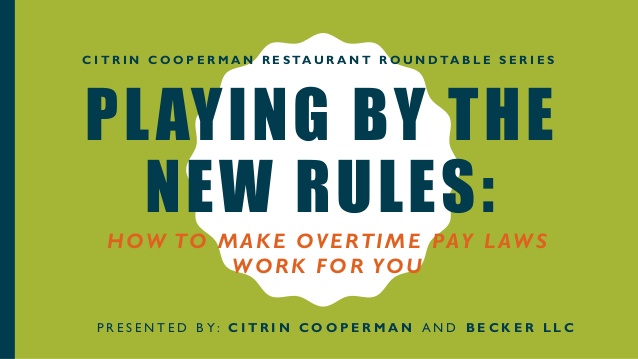Minding the Gap: Implications of New Overtime Pay Rules
3 Min Read By Barbara Castiglia
Adequate preparation and increased communication will be key tools for business owners when implementing new overtime rules later this year, according to panelists at a CFO Restaurant Roundtable presented by Citrin Cooperman and Becker LLC.
The U.S. Department of Labor’s new Final Rule announced earlier this year focuses primarily on updating salary and compensation levels needed for executive, administrative and professional workers to be exempt and more than doubles the current minimum salary that must be paid to treat employees as exempt. Starting December 1, owners will be required to pay managers a salary of at least $47,476 per year to remain exempt.
Other provisions include:
- setting the total annual compensation requirement for highly compensated employees subject to a minimal duties test to the annual equivalent of the 90th percentile of full-time salaried workers nationally, $134,004;
- establishing a mechanism for automatically updating salary and compensation levels every three years to maintain the levels at the above percentiles and to ensure they continue to provide useful and effective tests for exemption; and
- amending the salary basis test to allow employers to use nondiscretionary bonuses and incentive payments to satisfy up to 10 percent of the new standard salary level.
“It’s important to figure out who is in the gap right now,” said Nick Florio, CPA, Partner and one of Citrin Cooperman’s Restaurant and Hospitality practice leaders. “It’s going to require financial engineering.” Florio noted the importance of owners surrounding themselves with people familiar with the rules in order to determine the best solutions on a case-by-case basis.
One major concern is the rise in Fair Labor Standards Act (FLSA) lawsuits. According to Seyfarth Shaw LL’s 12th annual edition of the Workplace Class Action Litigation Report, FLSA filings in federal courts rose for the sixth straight year to a record high of 8,954 cases last year. New scrutiny of independent contractor and joint employment relationships are expected to drive that figure even higher in 2016, according to the study.
There has been a 432 percent increase in FLSA suits in the past 20 years, Martin Borosko, Member, Becker LLC, pointed out, adding the restaurant business is in the top three when looking at all industries and the New York Metropolitan area is in the top two for locations.
“There’s a bullseye on your back,” said Borosko. “Overtime allegations are the top complaint.”![CFORoundtable[1]](https://www.modernrestaurantmanagement.com/assets/media/2016/08/CFORoundtable1.jpg)
What can restaurant and other business owners do to prepare for the changes to come? Will insurance cover the potential risks? Panelists agreed the best defense is a good offense and taking care of business means taking care of your employees.
“It’s hard to insure for this type of risk and it could be prohibitively expensive, said Brian Curtis, Of Counsel, Becker LLC. “It’s better to just be in compliance.”
Borosko and Curtis feel effective and continual open communication between employer and staff will go a long way to helping all parties better understand the process and deal with the implementation.
“You have to be careful to have a succinct message to tell employees that their salary will improve and this was a choice imposed on the company and let them know the path to move forward, said Borosko. “Titles don’t change.”
“Management has to be consistently engaged in explaining this process to employees,” added Curtis. “If you want to retain a valuable employee, you have to deem to convey value to the individual.”
Stacy Gilbert, CPA, Partner and also one of Citrin Cooperman’s Restaurant and Hospitality practice leaders, strongly advises restaurant operators to keep accurate paperwork in place at all times and make recordkeeping part of the culture in the front and back of the house. She also suggests having employee handbooks for each position so duties and responsibilities are specific and clearly spelled out to avoid vulnerability.
“Document, document, document,” Gilbert stressed. “If you don’t have all employees clocking in and out, you run the risk of being challenged later. There’s no such thing as too little detail or not enough legal records. You are all exposed on so many levels.”


